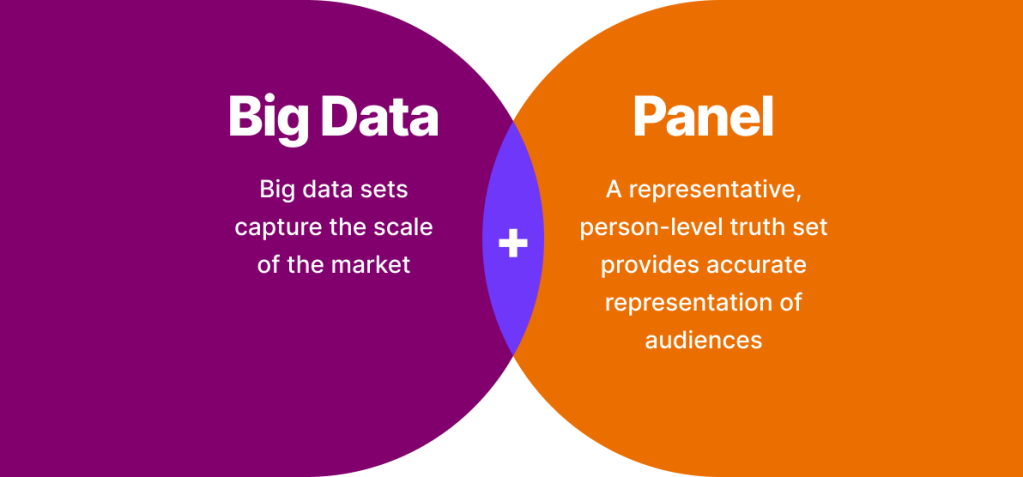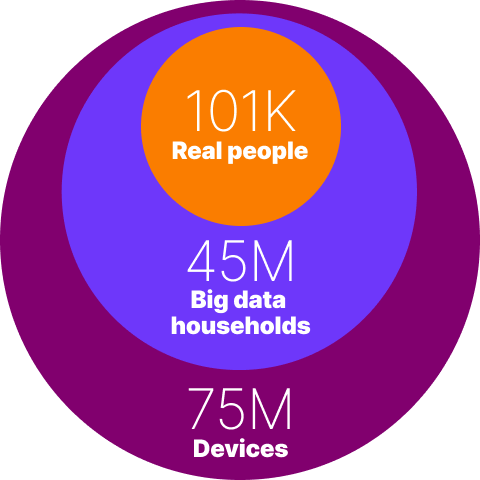
Die Macht von Big Data
+ Panelmessung
Planen, realisieren und messen Sie Ihr TV-Publikum mit der einzigartigen Mischung aus datenwissenschaftlichem Know-how und personengestützter Messung von Nielsen.
Übersicht
Die großen Daten, die Sie brauchen, um bessere Entscheidungen zu treffen
Die Zuschauer haben heute Zugang zu mehr Fernsehinhalten und Plattformen als je zuvor. Diese Fragmentierung hat es schwieriger denn je gemacht, Zuschauer mit den richtigen Anzeigen und Inhalten zur richtigen Zeit zu finden.
Durch die Kombination von Big Data von Set-Top-Boxen (STB) und Smart-TV-Geräten mit Paneldaten von tatsächlichen Personen helfen wir Ihnen, das heutige Fernsehpublikum besser zu verstehen. Seien Sie sicher, dass Sie mit dem Big Data + Panel-Ansatz von Nielsen zur Messung der Zuschauerzahlen die richtigen Zuschauer erreichen und ansprechen.

Vorteile
Entdecken Sie die Menschen hinter Big Data
Wir sind davon überzeugt, dass Big Data am nützlichsten ist, wenn sie von echten Menschen validiert werden, um ein vollständiges Bild des Publikums zu erhalten. Der Big Data + Panel-Ansatz von Nielsen bietet Ihnen eine Messung, die es in sich hat:
Zuverlässig

Dank stabiler und vorhersehbarer Einschaltquoten mit höherer Granularität können Sie mit mehr TV-Inventar arbeiten.
Abgeordneter

Verschaffen Sie sich einen möglichst umfassenden Überblick über das TV-Publikum - von unterschiedlichen Zuschauern bis hin zu denjenigen, die nicht zu Hause fernsehen - mit Messungen, denen Sie vertrauen können und die Verzerrungen minimieren.
Adressierbar

Planen und messen Sie mit fortgeschrittenen Publikumssegmenten im linearen Fernsehen über Alter und Geschlecht hinaus.
Was ist Big Data + Panel?
Qualitätsdaten in großem Maßstab
Was den Big Data + Panel-Ansatz von Nielsen auszeichnet, ist die Fähigkeit, den Zahlen in großen Datensätzen menschliche Einsichten zu verleihen. In den USA umfasst unser nationaler TV-Big-Data-Satz etwa 45 Millionen Big-Data-Haushalte und 75 Millionen Geräte von Comcast, Dish, DIRECTV, Roku und Vizio. Hinzu kommt unser Panel mit 101.000 Personen aus etwa 42.000 Haushalten.

Die Datenwissenschaftler von Nielsen validieren Hunderte von Millionen von Datenpunkten und Milliarden von Impressionen auf Bildschirmen anhand der Informationen von echten Personen, die unser Panel bilden, und korrigieren dabei Verzerrungen und andere Lücken in den Daten. Dies führt zu einer Messung auf Personenebene, die repräsentativ für die gesamte Bevölkerung ist. Entdecken Sie mit Big Data + Panel, das in die Produkte von Nielsen für die nationale und lokale TV-Messung sowie für die medienübergreifende Messung integriert ist, den umfassendsten Einblick in das Publikum von heute.








